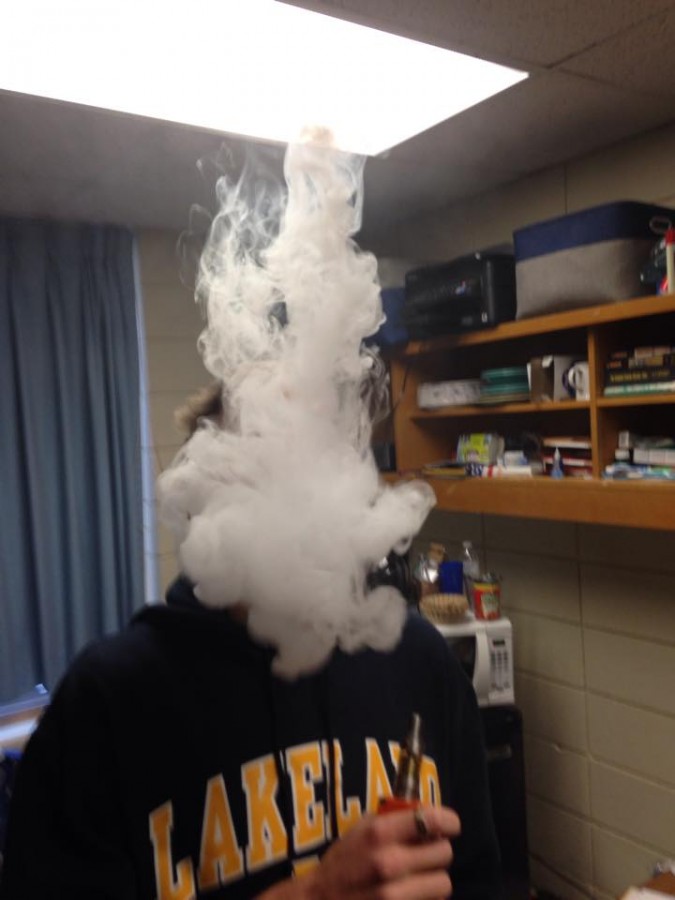Vaping rumors blown away
Anonymous student uses vape inside their dorm.
November 30, 2015
Lakeland’s policy when it comes to vaping is the same as its policy for smoking: the use of e-cigarettes/vaporizers are not allowed in any buildings on campus. The use of cigarettes or e-cigarettes in campus buildings will result in the incursion of a $100 fine per violation.
However, with the inconclusive evidence as to the harm of vaping, the question has been raised as to whether the college should restrict use in the same way as it does smoking.
Some students believe that vaping should be allowed in campus buildings. Mayce Bacon, junior writing major said, “I think that vaping should be allowed indoors, at least in dorms as long as any roommates are alright with it. I understand it could be a distraction in class, but I think in dorms/public places it should be fine.”
Within the past few years, the United States has seen a rise in the number of people who choose to “vape” instead of smoke cigarettes. These vaping devices, commonly referred to as e-cigarettes, are claiming that they are a safe alternative to smoking.
Jim Bajczyk, director of residence life, said, “right now the science is not proven as to them being harmless.” In Bajczyk’s eyes, the main reason for the limitations on vaping has to do with consideration for non-vaping students. Equating vaping to a potentially contagious health hazard, Bajczyk said, “you wouldn’t want to be in a room full of sneezing people would you?”
However, for students who do smoke, vaping may be a potentially better alternative. Bacon said “I’m a smoker and I am going to use vaping as a way to slowly get off nicotine. I think vaping is a great thing that should be used more by smokers and anyone else that has an interest in it. There just needs to be more information for people, because I don’t think many people know much about it unless they themselves vape or are interested in it.”
Another chief reason that the college does not allow vaping on campus is because of the ability for THC, the primary stimulant in marijuana, to be vaporized. “More and more people are starting to vaporize marijuana because it eliminates some of the odor, so there is a potential that there would be more drug violations going on without us knowing,” said Bajczyk.
On the flip side of the coin, vaping does has positive aspects. Bacon said, “I think that there might be a stigma against it, like smoking, but I think if people were educated about it, they’d realize it’s not like smoking in the aspect that it doesn’t have to be nicotine, it could just be flavored vapes!”
According to Bajczyk, “there is not much of any problem with students smoking or vaping within campus buildings. We haven’t had many reports of it.”
There is no need to worry about smoking being banned as a whole on campus, for students who may be concerned. Carole Robertson, vice president and chief financial officer, said, “To the best of my knowledge, Lakeland is not considering moving to a Smoke-Free Campus at this time.”
For clarification, Lakeland’s smoking policy is as follows:
Smoking (including e-cigarettes/vaporizers) or tobacco use is not allowed in any enclosed public (indoor) areas on campus. This campus policy is accordance with Wisconsin State Law, which took effect on July 5, 2010. An “enclosed public area” is defined as, “any enclosed public space to include an office, work area, elevator, employee lounge, stairway, lobby, common area, vehicle or cafeteria.” The college reserves the right to ask people to refrain from smoking or using tobacco. Should the person refuse to do so, the college has the right to ask that person to leave the premises. Anyone who fails to abide by the law may face penalties, including a forfeiture of $100 for each violation. All administrative, academic and residential buildings on the Lakeland College campus are smoke and tobacco free.



Alex Edwards • Apr 3, 2017 at 10:28 am
With there being many hazards to vaping there are also many goods things about vaping such as the fact that it is safer than cigarettes and can help stop smoking cigarettes. Though they can be used as a source of THC there are slight restrictions on the use of juices that contain THC therefore unless students knew how to make the juice themselves or where to buy it, that wouldn’t be much of a problem
Theresa Jordan • Dec 1, 2015 at 3:26 pm
It is all about respect. I highly recommend people to Vape Responsibly by http://www.southwestsmokeless.com/image/vape-responsibily.jpg